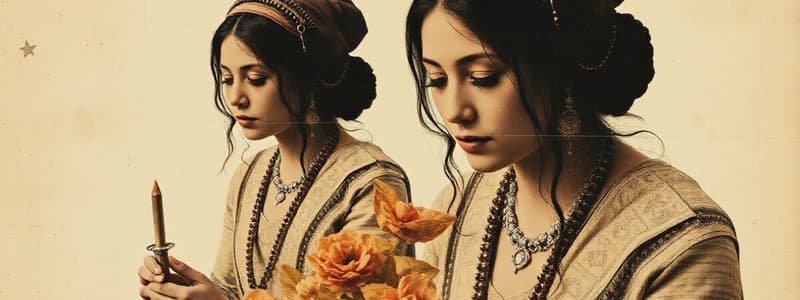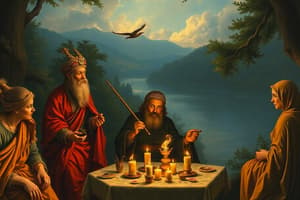Podcast
Questions and Answers
Who acted as the religious leader within the household?
Who acted as the religious leader within the household?
- The eldest male (correct)
- The priestess
- The mother
- The children
Women were permitted to lead household cults in ancient Greece.
Women were permitted to lead household cults in ancient Greece.
False (B)
What is the name of the festival restricted to adult women that honors Demeter and Persephone?
What is the name of the festival restricted to adult women that honors Demeter and Persephone?
Thesmophoria
The _____ was dedicated to Hestia and represented family unity.
The _____ was dedicated to Hestia and represented family unity.
Match the household god with their area of protection:
Match the household god with their area of protection:
What was celebrated through the Amphidromia ceremony?
What was celebrated through the Amphidromia ceremony?
Children did not have any religious responsibilities until they turned 16.
Children did not have any religious responsibilities until they turned 16.
What is the role of Arrephoroi?
What is the role of Arrephoroi?
Which goddess was primarily honored during the Panathenaia Festival?
Which goddess was primarily honored during the Panathenaia Festival?
The Olympic Games were held in Olympia to honor Poseidon.
The Olympic Games were held in Olympia to honor Poseidon.
What is the term for ritual impurity or pollution in ancient Greek religion?
What is the term for ritual impurity or pollution in ancient Greek religion?
The _______ was a major Athenian festival that included games and a grand procession.
The _______ was a major Athenian festival that included games and a grand procession.
Match the following sacred spaces with their descriptions:
Match the following sacred spaces with their descriptions:
What was the main purpose of the sacrifices during the Panathenaia?
What was the main purpose of the sacrifices during the Panathenaia?
Priests and priestesses in ancient Greece were often appointed hereditarily.
Priests and priestesses in ancient Greece were often appointed hereditarily.
What animal was typically sacrificed during the Great Panathenaia Festival?
What animal was typically sacrificed during the Great Panathenaia Festival?
The _______ Ark of the Twelve Gods functioned as a civic religious center in ancient Athens.
The _______ Ark of the Twelve Gods functioned as a civic religious center in ancient Athens.
Which of the following was not a part of the athletic contests in the Panathenaia Festival?
Which of the following was not a part of the athletic contests in the Panathenaia Festival?
Flashcards
Father as Religious Leader
Father as Religious Leader
The father, who was the eldest male, was responsible for leading the household in religious matters. He oversaw rituals, worshipped household gods, and ensured the family's connection to the divine.
Household Gods
Household Gods
Household gods protected different aspects of the home and family, like possessions, courtyards, and entrances. They were worshipped to bring good fortune and ward off misfortune.
Celebrating Hestia
Celebrating Hestia
Hestia, the goddess hearth, was honored in every home, signifying family unity. She was often invoked during fire ceremonies to welcome new family members, signifying the importance of the hearth as the heart of the family.
Miasma
Miasma
Signup and view all the flashcards
Peplos
Peplos
Signup and view all the flashcards
Deme
Deme
Signup and view all the flashcards
Hecatomb
Hecatomb
Signup and view all the flashcards
Panathenaia
Panathenaia
Signup and view all the flashcards
Euandrion
Euandrion
Signup and view all the flashcards
Stoa
Stoa
Signup and view all the flashcards
Temenos
Temenos
Signup and view all the flashcards
Sacred Hearth
Sacred Hearth
Signup and view all the flashcards
Propulaia
Propulaia
Signup and view all the flashcards
Study Notes
Household Religion
- Household religious practices focused on the oikos (household).
- The father led religious duties and rituals.
- Household Gods: Zeus Ktesios (protected possessions), Zeus Herkeios (guarded courtyards), and Apollo Agyieus (guarded entrances).
- Household Rituals: Hearths dedicated to Hestia (family unity); welcoming new members with fire ceremonies. Herms placed at crossroads for protection.
- Father's Duties: Maintained family tombs, offered libations at festivals like Anthesteria (wine) and Genesia (honoring the dead).
Women in Religion
- Women participated in civic and communal rituals, but weren't household cult leaders.
- Priestesses: Specific priesthoods (40 in Athens) for women, often linked to specific goddesses (e.g., Demeter for older women, Artemis for virgins).
- Women's Roles: Arrephoroi (sacred baskets to Acropolis), Grinders (cakes for Athena), Brauronia (Artemis festival as bears), and Basket-Bearers (sacrificial processions).
- Festivals: Thesmophoria (women's festival honoring Demeter and Persephone). Women performed mourning rituals (hair cutting, black clothing, wailing).
Children and Slaves
- Children: Amphidromia (birth ceremony), sons introduced to phratry (group association) at Apaturia, military training (ephebes) at 16.
- Slaves: Limited religious participation, some sought sanctuary in temples during hardships.
Religious Participation
- Deme Participation: Local festivals celebrated within Athenian demes, e.g., festivals honored Athena Polias and local heroes. Erchia Calendar, from the 4th century BC, lists 25 days of sacrifices to particular deities (and local heroes).
- Polis Participation: Large-scale religious events (temples, festivals, sacrifices) funded by the polis to foster civic unity.
- Panhellenic Participation: Large-scale festivals honoring specific deities e.g. Pythian Apollo (at Delphi) and Olympian Zeus (at Olympia). Specific games associated with these celebrations.
Religious Authority
- Priests and Priestesses: Overseeing rituals (sacrifices, libations) and temple maintenance. Some appointments were hereditary (Eteoboutadae, example priests of Athena Polias). Priests received state-funded payments.
- Archons (Magistrates): Archon Basileus (religious calendar, major sacrifices), Eponymous Archon (civic festivals), and Polemarch (military cults).
- Epimeletai (Overseers): Supervised processions, funded by the state by the 4th century BC.
Politics and Religion
- Oracles: Consulted before important decisions (e.g., Croesus and the Delphic oracle).
- Military Victories: Commemorated by dedications to gods (e.g., Stoa at Delphi, naval victories to Poseidon).
- Civic Assemblies: Often started with sacrifices (e.g., piglet's blood).
- Civic Funds: Sacred funds stored in temples, sometimes supporting military campaigns.
Religious Spaces
- Sacred Spaces: Temenos (walled sanctuaries), Agora (civic/religious center including the Altar of the Twelve Gods and the Temple of Hephaestus), Stoa of Zeus Eleutherios (victory over Persia), Prytaneion (government seat with a sacred hearth).
Impiety (Miasma) and Pollution
- Miasma: Religious impurity, causing dishonor to gods, impacting individuals/communities.
- Causes: Birth/death (required cleansing), uncleanliness, ritual failure, sexual activity (sometimes required fumigation/abstinence), and murder (most severe, requiring blood purification).
- Ritual Cleansing: Washing rituals, blood rituals (catharsis). Exegetai advised on purification.
The Panathenaia Festival
- Overview: Annual Athenian festival honoring Athena Polias; the Great Panathenaia held every four years.
- Civic and Inclusive: Open to citizens, metics, women.
Panathenaia Procession
- Procession: Started at Dipylon Gate, encompassing the Pompeion, concluding with offerings.
- Peplos: Aristocratic maidens wove the Peplos robe, draped on Athena's statue.
Panathenaia Sacrifices
- Sacrifices: Animals (e.g., oxen) to Athena Nike.
- Meat Distribution: Communal meat distribution for unity maintenance.
- Funding: City and wealthy citizens/metics provided funding for obligations.
Panathenaia Contests
- Rhapsodic and Musical Contests: Homer recitations; lyre competitions.
- Athletic Events: Stadion, Dolichos, boxing, Pankration (wrestling/boxing), Pentathlon. Winners earned Panathenaic Amphorae.
- Equestrian Contests: Chariot races, Apobates (chariot jumping).
- Tribal Contests: Euandrion (beauty contest), Pyrrhic dance, torch race,.
Key Terms
- Deme: Smallest Athenian political unit.
- Euandrion: Beauty contest leader in the procession.
- Hecatomb: Sacrifice of 100+ animals (oxen).
- Miasma: Ritual impurity or pollution.
- Peplos: Rectangular robe for Athena Polias.
- Polis: Greek city-state.
- Propulaia: Entrance gate to the Acropolis.
- Stoa: Colonnaded portico.
- Oikos: Household.
Panathenaia Significance
- Unified Athens: Shared religious, civic, athletic events demonstrated Athenian identity and unity.
- Demonstrated Athenian Identity: Showcased military, artistic, and religious achievements.
- Inspiration: Public artwork (e.g., Parthenon Frieze) inspired by the festival.
Studying That Suits You
Use AI to generate personalized quizzes and flashcards to suit your learning preferences.
Description
Explore the intricate practices of household religion and the role of women in ancient religious rituals. From the household gods that protected families to the various responsibilities of women such as priestesses and sacred roles, this quiz covers the dual aspects of faith within the domestic sphere. Test your knowledge on these fascinating topics of ancient beliefs and practices.




